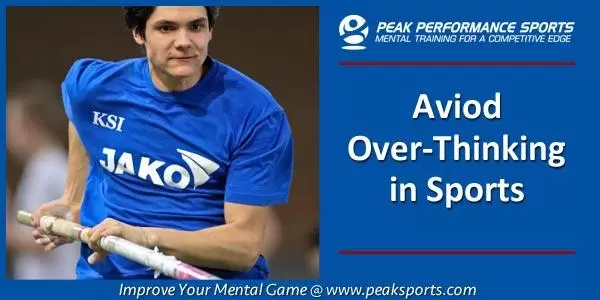
Do You Over Think In Competition?
Do you get in your own way when you compete? This is a common challenge for many athletes we coach on the mental game.
One way you (or your athletes) might get in your own way mentally is when you over think in competition, such as when you over think how to play the game technically.
How did you perform in those competitions?
Athletes who over think during competition have a hard time getting into the flow of the game. They over analyze every step as it unfolds…
For example, you might self-talk your way through the game… You thought, “I have to remember to _____” or “My opponent is doing this, so I need to do that.”
With every skill, shot, run, or pass, you evaluate if it was right or wrong… Any mistake you made, you harshly criticized yourself and your level of play.
Over-thinking, over-analysis, and being judgmental are performance killers.
Over-thinking interferes with doing or getting into the flow of your game.
Try this experiment: give yourself detailed instructions as you are attempting a skill in practice at a fast speed…
Chances are you will not perform the skill effortlessly, which should be the objective.
You want skills to be repetitious in training, trust your training, then let the performance unfold in competitions.
Maggie Connor, member of the 1992 US Olympic Ski Team and two-time World Pro Champion, was interviewed by me in regards to over-thinking performance.
Connor, Managing Director of Connor Training International, provides world-class training and services to inspire and train athletes to excel.
Connor has worked with individuals from Olympians, Major League Baseball players, National Football League players, Pro Tennis players, National skiers, cyclists, runners, triathletes, golfers and wind-surfers.
COHN: “What are the biggest challenges your athletes face rising to the next level of competition?”
CONNOR: “For the most part, it is [athletes] getting out of their own way. For many athletes, if they are stagnated at the same level, they are very much in their own head. My job is to help them get out of their head and to get into just what they are doing and relax and do it.
Because you would not be at this level if you were not exceptionally talented… When they get into trouble is when they get into their own head and over-think the process.
Once again, my job is to get [athletes] back to the core of why did you get into this in the first place, what is it that you love about it? Let’s focus on that and allow your body to do what it knows how to do.”
Not only does Connor highlight the problems with over-thinking but offers potential solutions as well.
Try these tips to get our of your own way:
- Tip #1: Trust your abilities when you compete. Shut off the active mind and allow your skills to happen from memory. Develop well-learned skills in practice first. Then when you compete, know that all your practice is complete and it’s time to perform.
- Tip #2: Become the child-like athlete. Remind yourself of the fun you had in your sport when you were young… That’s the reason why you chose your sport.
-For Peaksports Members- Listen to the full interview with Maggie Connor here: Peaksports Member Network
Successful athletes have learned to stop performance anxiety and play with ultimate composure. We’ve created The Composed Athlete Workbook Program to help you do this.
Related Sports Psychology Articles
- How Over Thinking Sabotages Athletes’ Performance
- How to Stop Overthinking in Competition
- How to Overcome “What-If” Thinking
*Subscribe to The Sports Psychology Podcast on iTunes
*Subscribe to The Sports Psychology Podcast on Spotify
Download a free sports psychology report to improve your mental game!
Learn more about our one-on-one mental game coaching.
The Composed Athlete

“The Composed Athlete” is presented on 80-minute Audio Programs with a 70-page step-by-step workbook that guides you through the program each day. It’s a complete system for conditioning your mind to have maximum composure in competition.
“The Composed Athlete” was developed for any level coach, parent, or junior to professional athlete who wants to improve performance and gain a competitive edge. It does not matter if you are a fledgling junior athlete; or a seasoned professional, plagued with distractions; or you just wanting to learn how to improve your composure…
